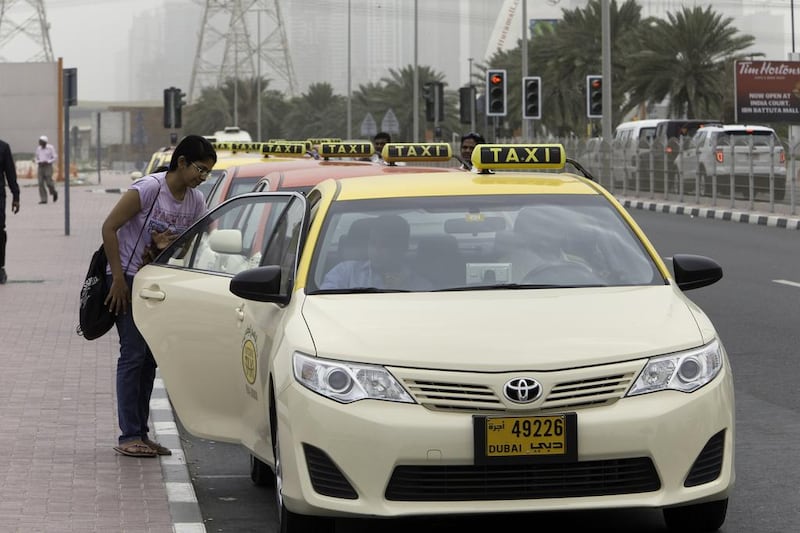DUBAI // The Roads and Transport Authority is reviewing working conditions for taxi drivers, who say they spend dangerously long hours behind the wheel.
Almost all drivers approached from the six taxi companies in Dubai say they work seven 12-hour days a week. Some work for 10 months a year.
The UAE Labour Law states adult workers should work a maximum of eight hours a day, six days a week. Any hours above that should be classed as overtime and earn an extra 25 per cent of the basic wage.
Drivers say they are not paid a salary but in commission, and receive no overtime payments.
“Poor people like me have no choice,” said a Bangladeshi, 32, who works for Dubai Taxi Corporation. “We have to work like this.
“My shift starts at 4am and I go through until 4pm. I get tired but what can I do? The company offers no help. Out of every Dh500, Dh100 is fuel and I get 35 per cent of the rest.”
Dr Yousif Al Ali, chief executive of the RTA’s Public Transport Agency, said it was reviewing drivers’ conditions.
“The RTA is studying working conditions of taxi drivers from different aspects and considering the coordination with the applicable laws to ensure the working conditions of taxi drivers are enhanced,” he said.
“Each of the operating companies establishes its business model within the applicable rules and regulations. Taxi drivers work with their corresponding company under the labour contract.”
Like many others, the Bangladeshi driver is urging taxi companies to give drivers two days off a month to recover, mentally and physically, from the stress of working on Dubai’s busy roads.
“I try and go to the gym every day to try and stay fit, as I am sitting down all day, but not everyone can do that,” he said.
Drivers must pay their own costs for licences, fines and vehicle repairs after a crash if they are found responsible by police.
Another Pakistani driver, 26, who recently moved to Cars Taxi Dubai from a company in Abu Dhabi, said: “I get very tired but what can I do? I have to do this job.
“I work for 12 hours every day, no weekends off unless I go back to Pakistan. I earn about Dh3,500 a month but I must pay for my licence.
“Some drivers get very stressed out with the long hours they work.”
A Dubai Taxis driver, 41, said he had developed kidney stones from sitting down all day, and had been in hospital to have five removed.
“I work long hours, all day every day, so I never have a fresh mind,” he said. “I get tired. I have been here for five years but I can’t handle it any more so I will go back to Pakistan.
“It is not good for my health to stay here. There is no salary or overtime, just commission. I earn a maximum of Dh4,000 a month.”
To qualify for the Dubai Taxi Corporation at the RTA, taxi drivers must pass a test, be aged between 21 and 45, and hold a valid light motor vehicle licence issued by the UAE.
They must show good conduct, speak English and be familiar with Dubai’s sites.
An automated system monitors the speed of more than 18,000 taxi drivers in Dubai, and any speeding outside of working hours using company vehicles.
Drivers have been recruited by the RTA under a commission system of payment since 2013.
nwebster@thenational.ae







